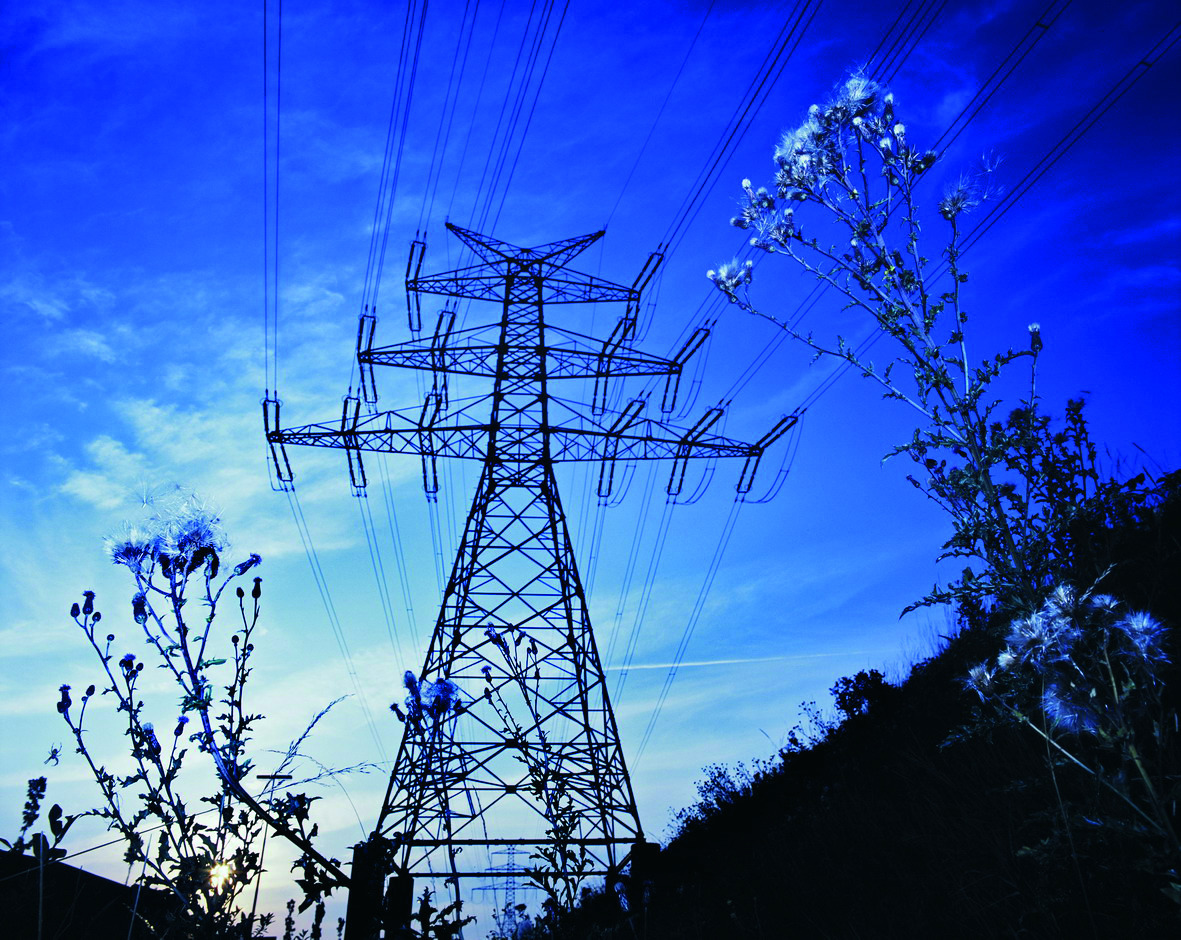Kategorie: ‘Veranstaltungen’
Invitation to a lecture: AI and medicine – three practical examples
Researchers from Uniklinik RWTH Aachen cordially invite you to attend a public online lecture entitled ‘AI and Medicine – Three Practical Examples.’ The event will take place on Wednesday, 21 January 2026, from 5:00 p.m. to 6:30 p.m. as a Zoom lecture followed by a discussion. Participation is free of charge, and a video recording will be made available afterwards.
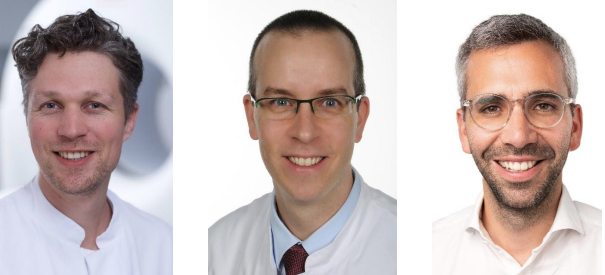
Photos Own images Truhn, Boor, Martin
The lecture will focus on how artificial intelligence (AI) already supports medical practice today and what challenges still stand in the way of its widespread clinical application. Using the three fields of application of radiology, pathology and intensive care medicine as examples, researchers from Aachen University Hospital will provide practical insights into current developments at the interface between medicine and computer science.
In radiology, AI has great potential, particularly in image analysis. Prof. Dr. Daniel Truhn uses breast cancer detection as an example to show how AI-based methods are already being used today, where they can support doctors, and why the path to routine care is still proving challenging. Radiology is currently in a transitional phase in which the first algorithms are finding their way into everyday clinical practice, but technical, regulatory and organisational hurdles still remain.
AI-supported methods are also changing diagnostic practice in pathology. Prof. Dr. Peter Boor explains how deep learning applications are already being used and what conditions are necessary for their efficient deployment. Digital infrastructure plays a central role here, but it is not yet available nationwide, particularly in Germany. The presentation shows how AI influences daily work in pathology and what developments can be expected in the future.
Intensive care medicine continuously generates large amounts of diverse data that must be evaluated on an ongoing basis in order to adjust treatment decisions. Dr Lukas Martin presents AI approaches that can help to make better use of this data, relieve the burden on medical staff and improve the quality and outcome of treatment. In addition to technical implementation, regulatory aspects and issues of acceptance among staff, patients and relatives will also be discussed.
The lecture is being held in cooperation with the Faculty of Computer Science at RWTH Aachen University, Forschungszentrum Jülich, the German Informatics Society, the Regional Industry Club for Computer Science in Aachen, Aachen University of Applied Sciences and the Aachen group of the German University Association, and highlights the importance of interdisciplinary cooperation for the use of AI in medicine.
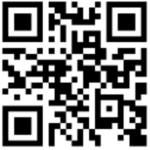
Access to webinar and video
Picture Coding Symposium 2025: Global Video Coding Experts at RWTH Aachen
Aachen became the global hub for image and video coding this December. For the first time, the renowned Picture Coding Symposium (PCS) was held at RWTH Aachen. Led by Professor Mathias Wien and Professor Jörn Ostermann, 162 participants from 19 countries gathered at the SuperC to share cutting-edge research.
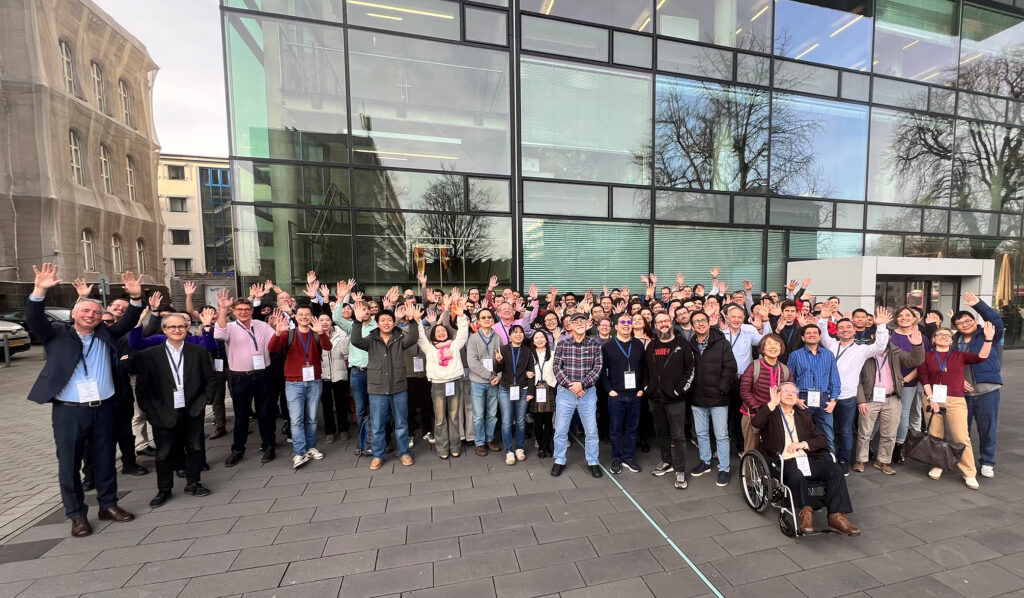
Foto: Mirco Seidler
A Tribute to Professor Jens-Rainer Ohm A major highlight was the honoring of Professor Jens-Rainer Ohm, former head of the Institute for Communications Engineering. His work on global standards like AVC, HEVC, and VVC is the foundation for video transmission on nearly every modern television and mobile phone.
The interactive atmosphere promoted the exchange of knowledge and ideas between international researchers from both academia and industry. The organizers were pleased with the positive feedback and emphasized the importance of such events for scientific progress and international cooperation.
The Science of Sound and Well-Being – Inside RWTH’s MOSAIC Project
Traffic noise, birdsong, or the hum of a computer – sounds are part of everyday life. But when do they start to affect our well-being?
That’s the question behind MOSAIC (Acoustic Well-Being in a Multi-Domain and Contextual Spatial Approach), a new graduate research group coordinated by RWTH Aachen University.
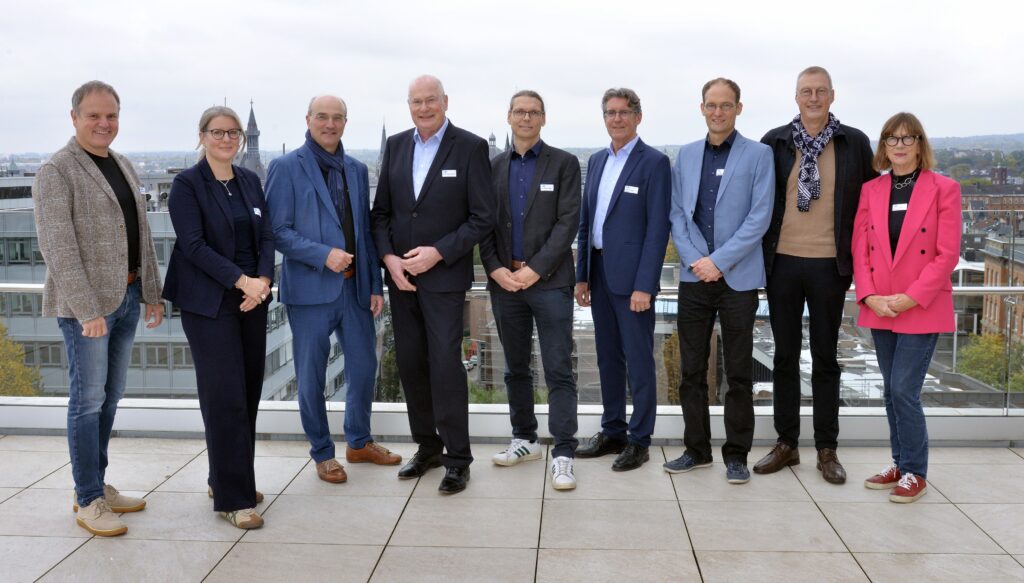
Foto: Andreas Schmitter
A key partner is the Institute of Hearing Technology and Acoustics (IHTA), led by Prof. Janina Fels, where engineers explore how sound and human perception interact.
Together with Prof. Marcel Schweiker from the Chair of Healthy Living Spaces, she investigates how acoustic comfort can be measured and improved.
As Prof. Schweiker notes: “Construction noise is usually perceived as more disturbing than birdsong – but at a certain level, even birdsong becomes tiring.”
Beyond volume, the team looks at how light, temperature, and room geometry influence how we experience sound – using methods and instruments deeply rooted in electrical engineering.
At the Kick-off Meeting on October 15, researchers and representatives of the HEAD Genuit Foundation gathered to launch the four-year program.
Foundation founder Prof. Klaus Genuit, a graduate of RWTH’s electrical engineering program and an honorary professor at the university, emphasized the importance of supporting young researchers in acoustic science.
“In a football stadium, I expect a certain level of noise – I’d be surprised if it were quiet,” Schweiker added.
MOSAIC aims to capture exactly this context dependency through modern sensing and signal-analysis techniques – many of which stem from ETIT’s research tradition.
Software-defined vehicles and automated driving – last call in Europe for new alliances and architectures

Professor Lutz Eckstein © IKA
Lecture by Professor Lutz Eckstein, Head of the Institute for Automotive Engineering at RWTH Aachen University and President of the VDI, on Wednesday, 22 October 2025, from 5:00 p.m. to 6:30 p.m. Admission is free. The lecture/discussion will take place via Zoom and will be available as a video recording afterwards.
The automotive industry is facing major challenges. As well as electrification and automated driving, these mainly relate to the underlying hardware and software architecture that defines the functionality of modern motor vehicles. As with smartphones, it is now possible to update the infotainment system with apps and updates. However, established vehicle manufacturers are reluctant to implement a service-oriented software architecture and provide frequent updates and upgrades for safety-related functions.
Emerging competition in the field of automated driving, however, makes this necessary. From both a social and customer perspective, it would be unacceptable to respond to critical situations or even accidents only after months with a software update. While new vehicle manufacturers with an IT background are already addressing this capability with suitable architectures, established manufacturers have so far attempted to develop expensive proprietary solutions with mixed results. Consequently, there is a growing willingness within the European automotive industry to collaborate on the development and use of open-source software, beginning with the S-CORE middleware. In his presentation, Professor Eckstein will highlight the challenges involved and the further cooperation required to achieve this.
The lecture series is being held in cooperation with the RWTH Computer Science Department, Forschungszentrum Jülich, the Regional Group of the German Informatics Society (RIA), the Regional Industry Club for Computer Science Aachen (Regina) and the Aachen Group of the German University Association.
Cheerfully building bridges from neuroscience to computer technology to AI

On 18 June 2025, as part of the RIA lectures, Senior Professor Rainer Waser will present research on interfaces in the fields of neuroscience, computer technology and AI.
In his online lecture, which will be followed by a panel discussion, Professor Rainer Waser from the Institute of Materials of Electrical Engineering 2 at RWTH Aachen University and the Electronic Materials division of the Peter Grünberg Institute 7 at Forschungszentrum Jülich, will discuss the current concepts, solutions, consequences and perspectives of research collaboration between different faculties. This free, one-and-a-half-hour event can be attended via Zoom and starts at 5 pm.
Professor Rainer Waser was awarded the prestigious Leibniz Prize in 2014 in recognition of his exceptional contributions to research in the field. The researcher’s interdisciplinary approach proved to be a pivotal element in this endeavour. At the beginning of 2025, he was awarded an honorary senior professorship at RWTH Aachen University. He continues to dedicate himself to researching memristive phenomena, neuromorphic computing and the relationship between functional oxides and their defect chemistry.
‘Not just immersing myself in one discipline, but building bridges – that’s what has driven me my whole life,’ says the researcher, talking about what motivates him.
The Regional Informatics Group Aachen (RIA) is part of Gesellschaft für Informatik, the German professional organisation for computer scientists. Members of the group work together to facilitate the exchange of information, discuss relevant topics, and represent common interests in computer science and IT in the region. RIA works closely with REGINA e.V., the Regional Computer Science Industry Club of RWTH Aachen University and Aachen University of Applied Sciences.
The Gesellschaft für Informatik is a local and international organisation that opens doors to the professional and scientific worlds. It enables computer scientists to engage in continuous dialogue with the scientific community. The Gesellschaft für Informatik acts as an intermediary body, bringing together scientists, industry professionals, and administrators, and representing their interests in politics.
You can participate in the event via this Zoom link. A video of the lecture and discussion will be made available on the YouTube channel of the Chair of Software Engineering shortly after the event ends.
If you would like to receive information about future RIA lectures, please e-mail vortrag@i3.informatik.rwth-aachen.de.
Neuromorphic Hardware: Kick-off event in January
The NeuroSys future cluster at RWTH enters its second phase
At the beginning of this year, the Cluster4Future NeuroSys (Neuromorphic Hardware for Autonomous Artificial Intelligence Systems) is entering its second phase.
The Clusters4Future initiative is part of the German government’s High-Tech Strategy 2025 and is funded by the Federal Ministry of Education and Research.
At the kick-off event at the end of January, more than 90 participants discussed their ideas and technologies for the development of neuromorphic hardware in the Super C at RWTH Aachen University.
Neuromorphic systems are modelled on the basic building blocks of the brain, neurons and synapses. Neuromorphic hardware is a resource-saving but powerful basis for energy-intensive artificial intelligence research operations. The aim is to create a technology basis for neuromorphic components and alogrithms, building on the basic research carried out at RWTH Aachen University and the Jülich Research Centre. The coordinator of the future cluster is Professor Max Lemme, Head of the Chair of Electronic Components at RWTH Aachen University.
Learning neuromorphic AI chips could soon enable energy-efficient on-site data processing and thus offer promising prospects for future working methods, smart city concepts and the Internet of Things. Various contributions from autonomous driving to learning systems and personalised medicine will also be delivered.
The second phase of the project is planned for three years and will see RWTH collaborating with a wide range of experts from research and industry.
Further information on the project can be found here
‘Colloquium Biomedical Engineering and Related Fields’ – Invitation to the current lecture
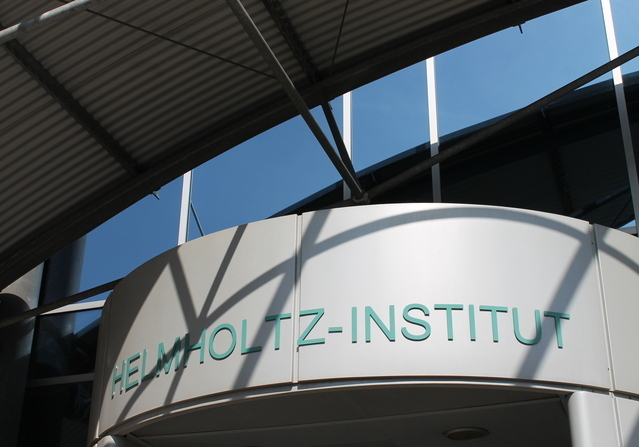
The lecture, entitled ‘Mobility in older adults‘, will be moderated by Professor Steffen Leonhardt, Chair holder of the Medical Information Technology (MedIT) at the Helmholtz Institute for Biomedical Engineering at RWTH Aachen University, on Thursday, 30 January 2025.
Professor Wiebren Zijlstra, Head of the Institute of Movement and Sport Gerontology at the German Sport University Cologne, will deliver a presentation on factors which underly age-related changes in mobility based on experimental laboratory-based studies as well as studies of real-life mobility.
In the abstract that precedes the lecture, Professor Zijlstra outlines the various challenges presented by mobility in daily life, such as finding the way to a target location, while ensuring safe progression by continuously perceiving the environment and adapting locomotion if needed, e.g. in order to avoid potential collisions with obstacles, other pedestrians, or traffic. Such adaptive control of locomotion requires physical and cognitive functions and, even without overt pathological conditions, age-related changes in functioning may cause older persons to show a reduced mobility and an increased fall risk. Mobility limitations are associated with reduced quality-of-life, a plethora of negative health outcomes, and an increased morbidity and mortality. According to Professor Zijlstra, it is important to understand factors that contribute to an age-related reduction in mobility and when possible develop effective interventions.
„Results of recent studies show that physical capacity alone is poor in predicting older adults’ mobility performance in real-life. Other studies show that age-related changes in cognition, especially the so-called executive functions, are associated with a reduced mobility and an increased fall-risk,“ the specialist points out.
Executive functions are crucial for adaptive locomotion, as they enable a person to monitor behaviour in relation to the environment and to adapt behaviour when necessary. By focusing on two key components of executive functions (cognitive flexibility and inhibitory control), this talk will also present recent results from studies that aim to better understand the role of cognitive control during mobility-related tasks.
Despite an abundance of mobility studies and increasing insight in factors that negatively impact on mobility in older persons, it is yet unclear to what degree the combination of these factors predicts real-life mobility, Professor Zijlstra continues in his apstract. Only a limited number of recent studies considered various potential mobility determinants by combining measures from physical, cognitive, and psycho-social functioning.
„These studies showed that real-life mobility cannot yet be predicted very well. Taken together, these findings necessitate more well-focused studies of real-life mobility in various groups of older adults, as well as experimental studies of older adults’ performance of complex mobility tasks which resemble daily life conditions,“ he concludes.
The ‘Colloquium on Biomedical Engineering and Related Areas’ is a regular series of events organised by RWTH Aachen University. The objective of the series is to facilitate interdisciplinary education in these fields and to encourage the interdisciplinary exchange of ideas.
A cordial invitation is extended to all students, clinicians, engineers and scientists to attend this illuminating lecture and engage in discourse with experts in the field of biomedical engineering.
The event will take place from 5 to 5:45 pm at the Helmholtz Institute for Biomedical Engineering at RWTH Aachen University, Pauwelsstraße 20, 52074 Aachen, Germany, seminar room 2.70. It will be coordinated by Prof. Dr. Klaus Radermacher, Chair of Medical Engineering, RWTH Aachen University. For further information please contact the secretariat at meditec@hia.rwth-aachen.de or call +49-(0)241-80 23870.
Hackers, attacks and malware – an up-to-date overview
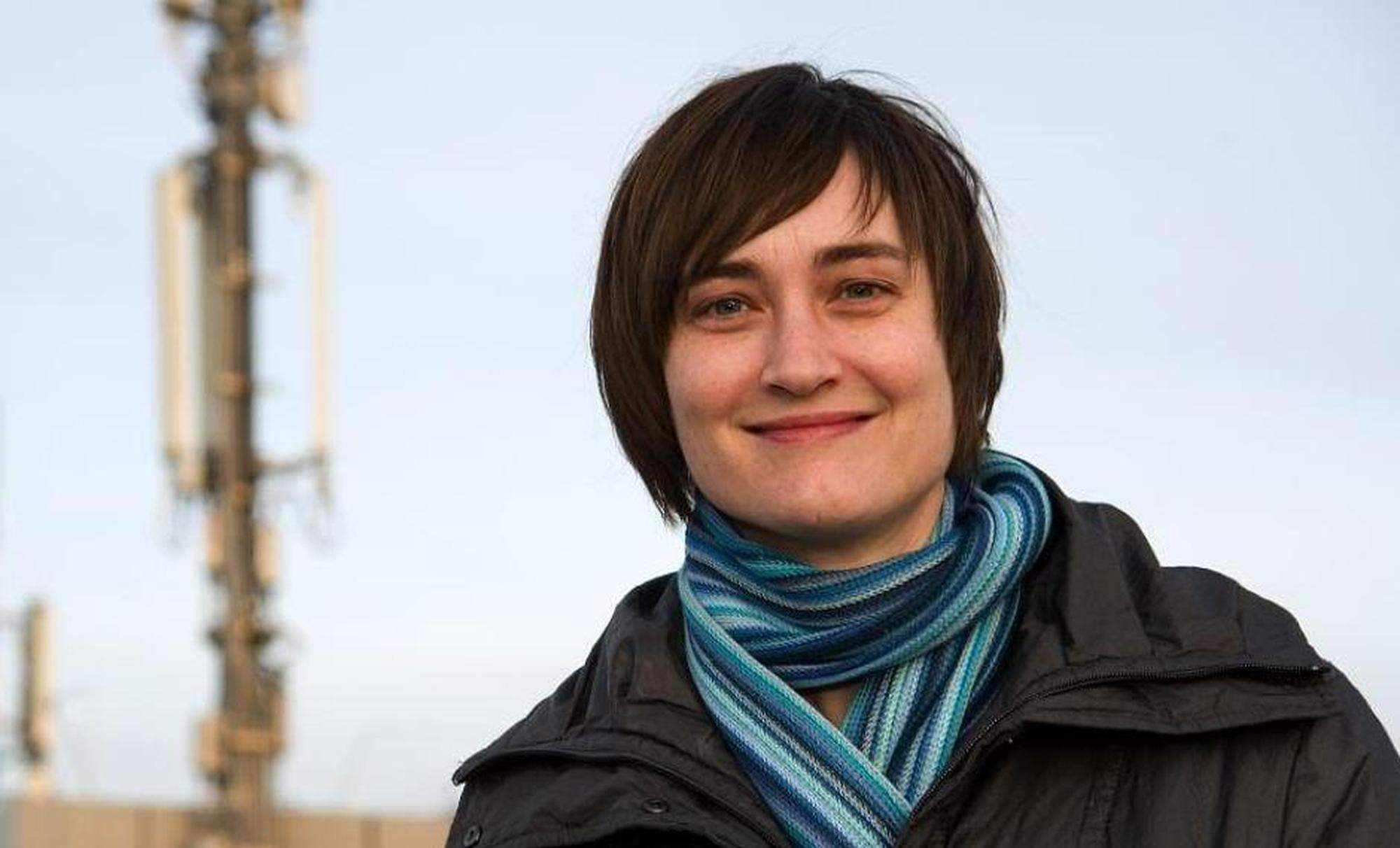
Professor Ulrike Meyer, ©Peter Winandy
Professor Ulrike Meyer from the Department of IT Security at RWTH Aachen will give an online lecture on Wednesday, January 29, 2025, from 5:00 PM to 6:30 PM, followed by a discussion. Admission is free.
The threats posed by cyberattacks have steadily increased, and IT security has thus increasingly come into focus for companies as well as individuals. During the presentation of the current report on the state of IT security in Germany (2024) by the Federal Office for Information Security, its president Claudia Plattner describes the IT threat situation as “worrisome” and states that “particularly ransomware, espionage, and disinformation endanger our prosperity and our democracy”.
The lecture addresses current attacks and the underlying business models of cybercriminals. Additionally, a selection of solution approaches developed at RWTH for attack detection using machine learning will be presented.
In cooperation with the Computer Science Department of RWTH, FZ Jülich, Regional Group of the Society for Computer Science (RIA), Regional Industrial Club for Computer Science Aachen (Regina), and Aachen Group of the German University Association.
Access to the webinar and video via access link
If someone misses the lecture, they can watch it later as a video.
Birthday edition of the RWTH Science Night ‘5 to 12’
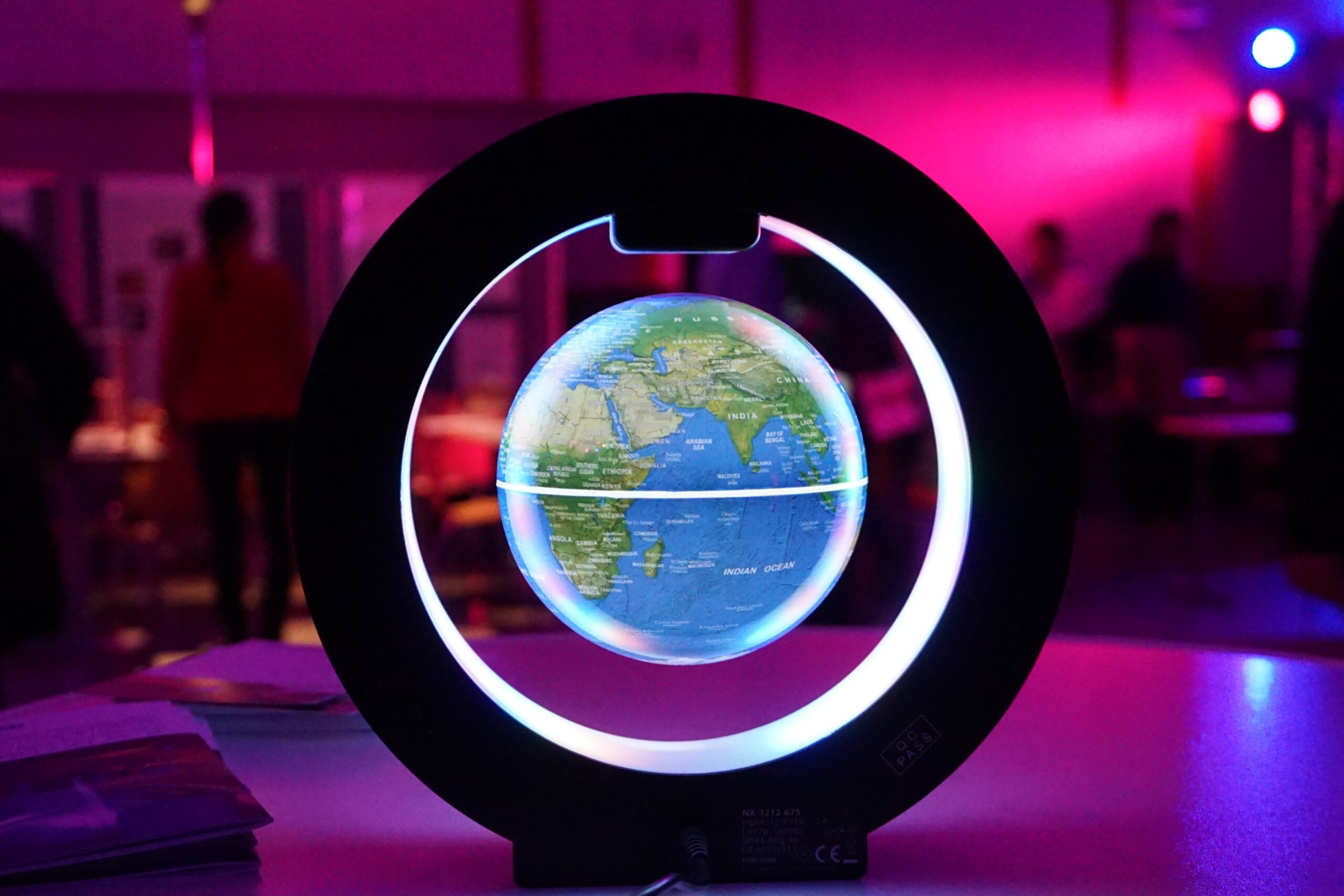
The magnetic globe rotates weightlessly on its own axis – just like in outer space
For the 20th time, RWTH Aachen University offered a glimpse behind the scenes. This time, 7,200 visitors, including many children, came to the C.A.R.L. auditorium between 6 p.m. and midnight to experience the world of research at close quarters.
What started out as a modest idea to present science at an unusual time, in an entertaining way and free of charge to anyone interested, has grown over the past 20 years into a mega-event that not only attracts thousands of guests, but also inspires the members of the university involved. Once again, the team of the Faculty of Electrical Engineering and Information Technology welcomed curious children of all ages and were on hand to help them with experiments.
With questions such as “Why isn’t the light on now?”, “How does that work?” or “Can I do one more experiment?” younger children followed their natural urge to discover new things.
The programme included reconstructing electrical circuits where they could visualise electric current as light or movement. They made switches, explored the magnetic and thermal effects of electricity, learned to distinguish between conductors and non-conductors, and finally became familiar with electricity.
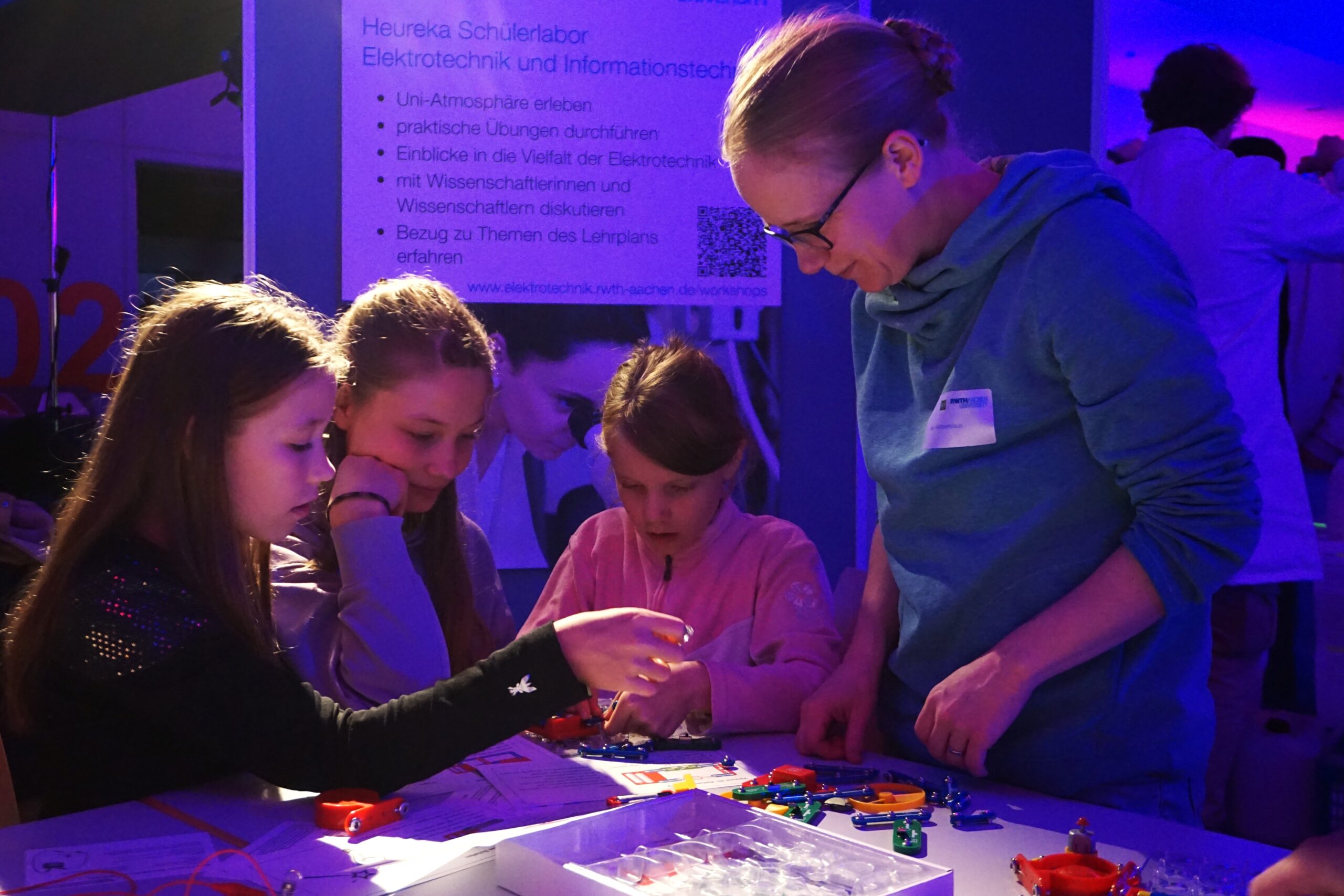
Faculty members provide support when experimenting with electric circuits
Older children ‘already had this at school’ and enjoyed putting their theoretical knowledge to the test. But adults also found their way to our station, taking the opportunity to generate lightning with the influencing machine, thoughtfully lingering in front of the floating globe, or attentively studying the model of the power distribution network set up by the Chair of Automation of Complex Power Systems. The joy of experiencing research and progress together is clearly at the centre of the Science Night.
„We want to show in an entertaining way what RWTH has to offer – and in such a way that everyone who wants to know something can understand it,’ said Rector Ulrich Rüdiger.
The potential of the Science Night is therefore even greater, as it represents an important interface where the direct transfer of knowledge takes place in a social and cultural context. In line with the motto ‘from the laboratories to the people’, it makes an important contribution to promoting proximity between science and society.
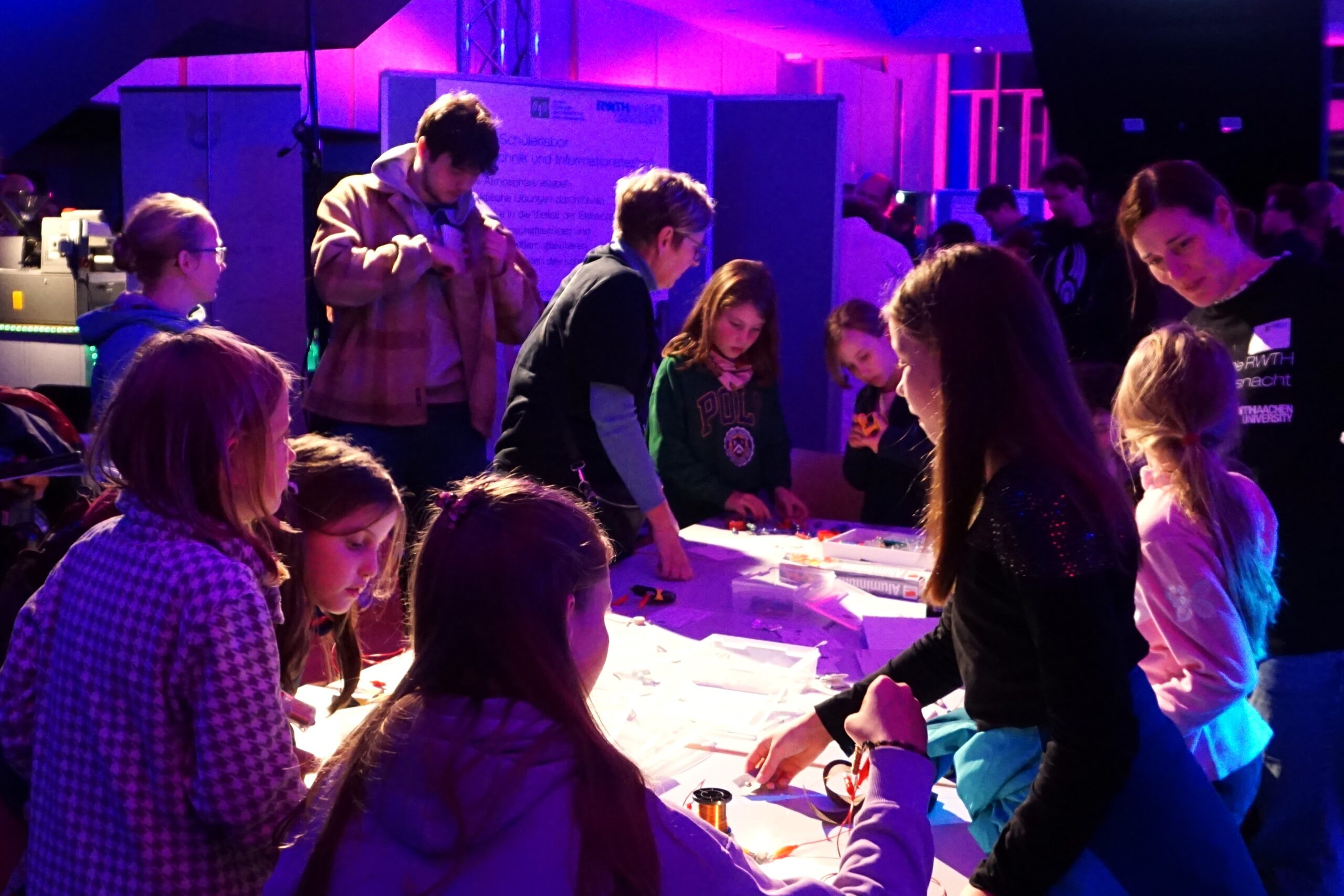
The station of the Faculty of Electrical Engineering and Information Technology, equipped with numerous child-friendly experiments
The programme for this year’s Science Night took place in ten lecture halls and numerous seminar rooms. There were over 80 shows and lectures, experiments, talks and discussions. From Artificial Intelligence (the experts from the RWTH’s AI Centre had brought along the robot ‘Pepper’ for support) to the ‘Physics Fair’, from the latest information on the US elections and the spectacular ‘Fascination of High Voltage’ to the circular economy, floating Teslas and the construction site of the future. The range of topics was as colourful and diverse as the RWTH itself.
Further information on the programme, as well as impressions and experiences of the organisers – Department of Press and Communication, Section 3.2 – can be accessed via the links.


